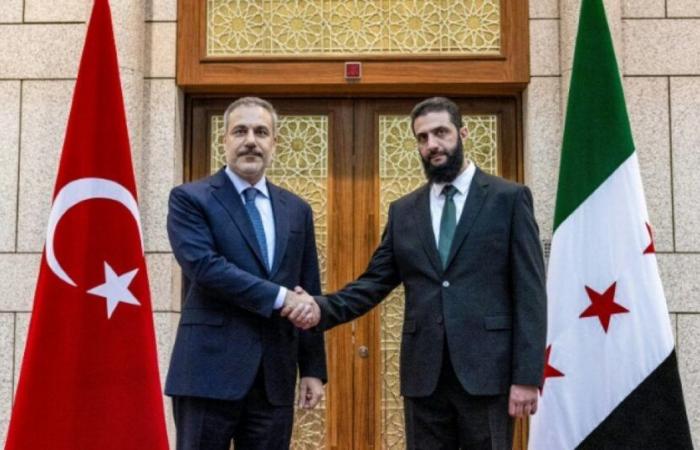Syria's new strongman, Ahmad al-Chareh, received the head of Turkish diplomacy on Sunday as well as a delegation from Lebanon, promising the end of “negative” Syrian influence in his neighbor, two weeks after the fall of the power of Bashar al-Assad.
The Turkish Foreign Ministry announced that Hakan Fidan had met Ahmad al-Chareh, and a video from the state-run Anadolu agency showed them hugging.
The head of Turkish intelligence, Ibrahim Kalin, had already visited the Syrian capital just four days after rebel groups dominated by radical Islamists seized power on December 8.
Diplomats from different countries, including the United States and France, have since gone to Damascus to meet the new authorities.
And Washington on Friday abandoned the reward offer for the arrest of the new Syrian leader, whose radical group Hayat Tahrir al-Sham (HTS) is however still classified as “terrorist” by several Western countries.
A senior Syrian diplomat told AFP in Riyadh that the Saudi government had also established direct contact with the new Syrian authorities and would send a delegation to Damascus.
– “Equal distance” –
Mr. Chareh also received Lebanese Druze leader Walid Jumblatt in Damascus on Sunday, for a first meeting with a leader of this neighboring country, which suffered for decades from the interference of the Assad clan, to whom numerous acts of violence are attributed, including multiple assassinations.
Syria will no longer have “negative interference in Lebanon and will respect Lebanon's sovereignty, its territorial integrity (…) and its stability”, Ahmad al-Chareh assured him.
“It will stand at an equal distance from everyone” in Lebanon, he added, affirming that Syria was in the past “a source of fear” in Lebanon.
Mr. Jumblatt was at the head of a large delegation of deputies from his parliamentary bloc, including his son Taymour, who succeeded him at the head of the Progressive Socialist Party, and Druze religious dignitaries.
He spoke at the presidential palace with Ahmad al-Chareh, who appeared for the first time in a suit and tie, and who was known until now by his nom de guerre Abu Mohammad al-Jolani.
Mr. Jumblatt accuses the deposed Syrian power of having assassinated his father, Kamal Jumblatt, in 1977, during the Lebanese civil war. The assassinations of many other Lebanese anti-Syrian leaders are attributed to former President Bashar al-Assad and his predecessor, his father Hafez.
The Druze minority, an esoteric sect descended from Islam, is distributed between Lebanon, Syria and Israel.
After the fall of Bashar al-Assad, who posed as the protector of minorities in a Sunni majority country, the new authorities, from the Islamists of HTS, are being scrutinized for the way they will treat minorities in a multi-ethnic country. and multi-faith.
The transitional government has already committed to respecting the rights of all Syrians.
Mr. Chareh called on the Lebanese to “erase from their memory the memory of ancient Syria in Lebanon.”
– Iranian militias –
The Syrian army intervened in Lebanon in the middle of the civil war in 1976 and during various episodes of the Lebanese conflict, before withdrawing in 2005 under popular pressure after the assassination of former Prime Minister Rafik Hariri. .
Rafik Hariri's son, Saad, and many Lebanese politicians had accused the Syrian government of this assassination, for which an international court found members of pro-Iranian Hezbollah, Syria's ally, guilty.
The new Syrian leader also denounced the role that Iran played in Syria, affirming that the presence of “Iranian militias constituted a source of concern for all regional and international countries”.
Russia and Iran, with their allied militias and notably the powerful Hezbollah, were the main supporters of Bashar al-Assad's power during the civil war which began in 2011 and left some 500,000 dead.
Iran “does not have” proxies in the Middle East and does not “need” them, Iranian Supreme Leader Ayatollah Ali Khamenei said on Sunday.






